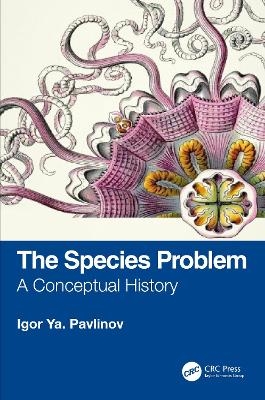
The Species Problem
CRC Press (Verlag)
978-1-032-38681-2 (ISBN)
Key Features
Provides new insights into the persistent species "problem."
Focuses on conceptual history and identifies pivotal landmarks in the history of the concept of species.
Argues for a scientific consistency of species pluralism.
Discusses the "evolving species-hood" in the context of new essentialism.
Related Titles
• Wilkins, J. S, et al., eds. Species Problems and Beyond: Contemporary Issues in Philosophy and Practice (ISBN 978-1-0322-2147-2)
• Mishler, B. D. What, if anything, are species? (ISBN 978-1-4987-1454-9)
• Wilkins, J. S. Species: The Evolution of the Idea, Second Edition (ISBN 978-1-1380-5574-2)
• Sigwart, J. D. What Species Mean: A User's Guide to the Units of Biodiversity (ISBN 978-1-4987-9937-9)
Igor Ya. Pavlinov was, until his retirement in 2018, a leading researcher and chief of the Mammal Division at the Zoological Museum at the Lomonosov Moscow State University. Currently, he is the curator of mammals at this museum. His principal research interests are in theoretical taxonomy and phylogenetics, systematics of mammals, and morphometrics. He is the author of several dozen books on natural history, including: Cladistic Analysis: Methodological Aspects (1990), Evolution of Life (2001), Systematics of Mammals of the World (2003), Foundation of the Contemporary Phylogenetics (2005), Nomenclature in Systematics (2015) and its successor Taxonomic Nomenclature—What's in a Name: Theory and History (2022), Foundation of Biological Systematics (2018) and its successor Biological Systematics: History and Theory (2021), Mammals of Russia: A Reference and Guide (2019), several books on particular orders and families of mammals, etc.
PREFACE
INTRODUCTION
CHAPTER 1. THE SPECIES PROBLEM: IN BROAD STROKES ON A CONCEPTUAL HISTORICAL CANVAS
1.1. Developing cognitive situation
1.1.1. Structure of cognitive situation
1.1.2. Species, species concept, species problem
1.2. History on a conceptualistic account
1.3. A historical narrative of the species problem
CHAPTER 2. ANTIQUE NATURAL PHILOSOPHY: SPECIES AS EIDOS
2.1. Classical period: the birth of genos and eidos
2.1.1. Plato’s eidology
2.1.2. Aristotle’s ousiology
2.1.3. Aristotelian polysemy: the problem arises
2.1.4. Theophrastus’ Enquiry into Plants
2.2. Neoplatonists: Porphyry's questions
CHAPTER 3. THE MIDDLE AGES: SPECIES AS UNIVERSALIA
3.1. An eve of scholasticism: the beginning of genus and species
3.2. Realism: species really exists
3.3. Conceptualism: species concept refers to something real
3.4. Nominalism: species concept refers to nothing real
3.5. Genus-species scheme
CHAPTER 4. THE RENAISSANCE AND THE EARLY MODERN TIMES: SPECIES AS CLASSIFICATION UNIT
4.1. The Renaissance turn and the "second" scholasticism
4.2. The early Modern Times: natural-classificatory dualism
4.3. The origin of systematics: species of the living
4.3.1. Herbal epoch as a precursor
4.3.2. From Cesalpino to Ray: a scholastic legacy
4.3.3. Tournefort and Linnaeus: disconnection of genus and species
4.3.4. Adanson, Jussieu, etc.: the birth of natural systematics
4.3.5. "Ladderists" against "Systemists"
CHAPTER 5. THE MODERN TIMES: SPECIES AS BIOLOGICAL UNIT
5.1. The forerunners: initial routs of objectivation of biological species
5.1.1. Biblical motifs
5.1.2. Generative idea
5.2. The 19th century and beyond: biologization of the species problem
5.2.1. Evolutionary idea: species as an actor of biological evolution
5.2.2. Ecological idea: species as a component of ecosystem
5.3. Biosystematics and others: fall and rise of species
5.4. "Multiplication of essences": the kinds of species
CHAPTER 6. THE CONTEMPORARY: THE NEWEST ISSUES
6.1. Species definition: a conceptual pyramid
6.2. Species ontology: new questions
6.3. The "new essentialism": an evolving specieshood?
6.4. If not species, then what?
REFERENCES
INDEX
| Erscheinungsdatum | 08.02.2023 |
|---|---|
| Verlagsort | London |
| Sprache | englisch |
| Maße | 156 x 234 mm |
| Gewicht | 560 g |
| Themenwelt | Naturwissenschaften ► Biologie ► Botanik |
| Naturwissenschaften ► Biologie ► Zoologie | |
| Weitere Fachgebiete ► Land- / Forstwirtschaft / Fischerei | |
| ISBN-10 | 1-032-38681-9 / 1032386819 |
| ISBN-13 | 978-1-032-38681-2 / 9781032386812 |
| Zustand | Neuware |
| Haben Sie eine Frage zum Produkt? |
aus dem Bereich


